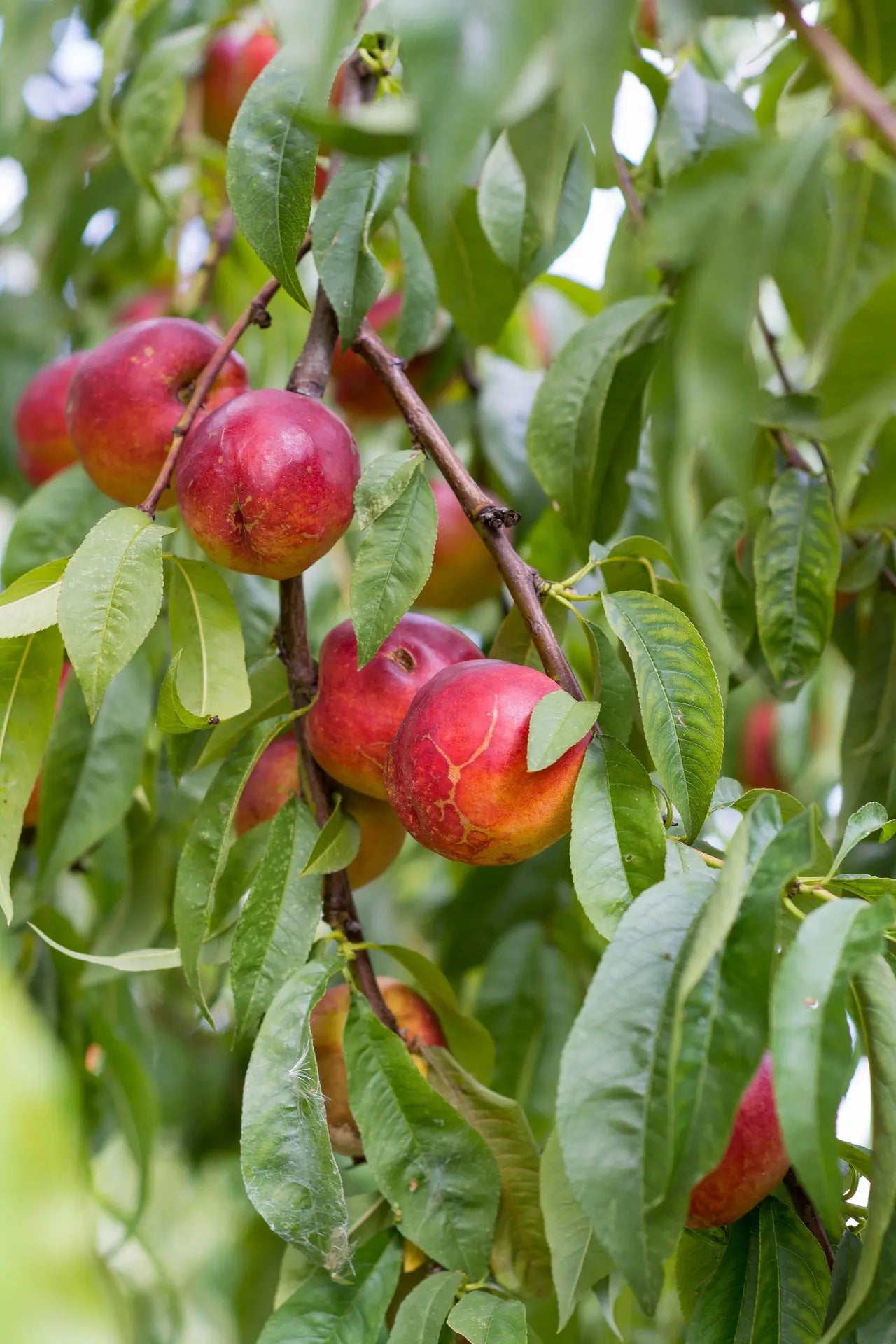-
Delivery from 10 plants to France, Switzerland and Europe
Delivery method -
Fruit Tree Wholesale Supplier
About Us -
Quality Fruit Tree Plants
Technical itinerary
Tahiti-cov Yellow Flesh Nectarine Tree grafted on Garnem 1L pot
Tahiti-cov Yellow Flesh Nectarine Tree grafted on Garnem 1L pot
The prices shown are our base prices for large volumes. Depending on the quantity ordered and the producers’ pricing scales, the rate may be adjusted upward. Each quote is personalized to ensure you receive a fair price.
Mini order 50 units / Multiple orders 10 units (FRSHER202503001)
Couldn't load pickup availability
 Buy now and get it delivered when you're ready to plant - Add your desired date to your quote request
Buy now and get it delivered when you're ready to plant - Add your desired date to your quote request
- Delivery from 10 plants to France, Switzerland and Europe

Technical sheet of the Tahiti-cov yellow flesh nectarine variety
- Fruit flesh color: Yellow
- Skin color: 100% red
- Size and shape: Large caliber (AA), round in shape and without a point
- Tree Size: Medium vigor, semi-open habit
- Fruit maturity: About 5 days after the Luciana-cov variety
- Fruit taste: Excellent organoleptic qualities (AA)
- Earliness of the variety: Seasonal
- Fruiting period
- Disease resistance and storage: Very good firmness, no problem with fruit cracking
- Variety yield: Very good production, very good flowering and fruit set
- Is this variety self-fertile? Yes
- Commercial use: Mainly intended for fresh consumption
- Is this a COV variety? Yes, CPVO protection in 2023. Breeder PSB Producción Vegetal.
- Comments: Recently obtained.
Quick read / the essentials on Nectarinier Tahiti-cov
The Tahiti-cov variety stands out as an early yellow-fleshed nectarine , perfectly shaped to meet the demands of fresh produce sales channels from the beginning of summer. Its AA-sized fruit, with its intense red skin covering 100% of the surface, is very attractive on the shelves. It combines remarkable firmness and a sweet, AA-rated flavor, guaranteeing an excellent taste experience. Perfectly suited to professional orchards, the Tahiti-cov nectarine tree has a semi-open habit, medium vigor and intense flowering.
For orchardists looking for precocity and profitability, buying Tahiti-cov nectarine plants is a strategic choice. Arboriverse , a specialist wholesale supplier of nectarine plants , offers this certified variety, suitable for high-performance orchards. Thanks to its self-fertility, Tahiti-cov integrates easily into single-variety orchards. Its resistance to cracking reinforces its production stability, even in irregular climatic conditions.
Do you want to position yourself at the top of the season with a variety that combines presentation, firmness and flavor? It's time to buy Tahiti-cov nectarine plants from your specialist nectarine plant wholesale supplier , to secure your volumes and optimize your commercial segmentation from the end of June.
Technical presentation of the Tahiti-cov yellow flesh nectarine variety
Tahiti-cov is a recent variety of yellow-fleshed nectarine, developed by the breeder PSB Producción Vegetal , a Spanish company specializing in fruit varietal selection. It benefits from protection by Plant Variety Certificate (PVC) under the number EEC 2023/2258 , which implies strict regulations on its multiplication and marketing.
Fruit characteristics
The fruits of Tahiti-cov are round in shape and without a point , with an average size classified AA , indicating a large size, sought after for fresh markets.
The intense red skin , covering 100% of the epidermis , gives a remarkable visual presentation. The yellow flesh is associated with very good firmness , a quality appreciated for post-harvest storage and marketing.
The organoleptic qualities are rated AA , reflecting an excellent mild flavor . No numerical information on the Brix degree is given, but all the descriptions suggest great taste satisfaction.
Tahiti-cov does not present any cracking problems , an important asset for securing the harvest at the end of fattening, particularly in irregular climatic conditions.
Flowering and harvest period
The Tahiti-cov variety is early . It ripens about 5 days after the Kinolea-cov variety and before Luciana-cov , which places its probable harvest period between the end of June and the beginning of July in the southern areas of France.
This precocity constitutes a strategic commercial advantage , allowing it to position itself early on the markets, before the massive arrival of other seasonal varieties.
Tree behavior
The Tahiti-cov tree has medium vigor and a semi-open habit , facilitating light penetration and air circulation. These characteristics promote uniform fruit coloring and reduce the risk of fungal disease development.
The adult size of the tree is estimated between 3 and 5 meters , as for most nectarine trees, depending on the rootstock and the training system.
Flowering is noted as very good , with no mention of any particular sensitivity to frost. However, in exposed areas, spring protection may be useful.
Fertility and pollination
Tahiti-cov is a self-fertile variety, which simplifies orchard design and allows for single-variety orchard production . No specific pollinator is required, although the proximity of other cultivars can optimize cross-pollination and therefore yields.
Performance and productivity
Productivity is described as very good . Although the sources do not specify yield in tonnes per hectare , the high sizes and firmness of the fruits suggest an interesting economic production potential for producers oriented towards commercial quality.
Under optimal conditions, a yield of 30 to 40 kg per tree can be expected, depending on the rootstock and cultural practices.
Resistance and sensitivity
No specific mention is made of resistance to diseases (blister, powdery mildew, brown rot) or parasites (aphids, thrips). It is therefore advisable to apply an integrated protection strategy , including regular monitoring and preventive treatments according to regional intervention thresholds.
The variety showed no signs of cracking , which is a significant advantage, especially in humid conditions or at the end of fattening.
Adaptation to the environment and recommended rootstocks
The choice of rootstock must be adapted to the soil and climate conditions of the growing area. Although no specific recommendations for Tahiti-cov are given, the following rootstocks are most often recommended for nectarine trees in France:
-
GF 677 : Widely used, suitable for calcareous and dry soils , excellent for southern areas.
-
Cadaman : Good for heavy soils and replanting , compatible with early varieties.
-
Montclar : Medium vigor, suitable for light, well-drained soils .
-
Julior : Specific to heavy or wet soils .
-
Rootpac 20 / 40 : Suitable for high density cultivation or to limit tree vigor.
No specific data are available on drought resistance , lime tolerance , or root asphyxiation . These factors must be managed through careful choice of rootstock , efficient drainage , and adequate irrigation .
Commercial valuation
With its large-sized fruits , its very beautiful uniform red color , its high firmness , and its excellent taste qualities , Tahiti-cov is intended for fresh consumption .
The combination of precocity and commercial quality makes it a strategic variant for producers targeting early markets , particularly in direct sales, in specialized circuits or for export.
Its firmness allows for good shelf life and facilitates post-harvest logistics (sorting, packaging, transport).
Cultural recommendations
-
Plan for axis or goblet training depending on local practices and the vigor induced by the rootstock.
-
Implement controlled irrigation , especially during the fruit growth phase.
-
Apply regular thinning to optimize size and vegetative balance.
-
Anticipate classic preventive treatments in phytoprotection .
-
Consider late frost periods if planting in risk areas.
Conclusion
Tahiti-cov is an attractive option for producers looking for an early variety with high quality potential. Its high size , impeccable presentation , sweet flavor , and self-fertility make it particularly suitable for commercial orchards focused on quality and precocity .
Its firmness and resistance to cracking enhance its logistical value . It fits easily into a staggered harvest schedule , allowing for the optimization of labor and market slots.
To summarize: Nectarine tree Tahiti-cov
The Tahiti-cov nectarine tree is a major asset for producers aiming for early marketing of quality fruit. Thanks to its intense red fruits , firm yellow flesh, AA size and mild, sweet taste, this variety meets the expectations of premium markets. Its maturity in early July , its self-fertility and its resistance to cracking make it a complete solution for fresh fruit professionals.
Arboriverse , as a specialist wholesale supplier of nectarine plants , supports arborists wishing to purchase Tahiti-cov nectarine plants in the best conditions. The choice of rootstock (GF 677, Cadaman, Montclar, etc.) allows the variety to be adapted to different pedoclimatic contexts. Its balanced shape facilitates aeration and coloring, while simplifying cultivation operations.
Firmness, precocity, taste quality and impeccable presentation: so many assets that justify buying Tahiti-cov nectarine plants to boost your summer production. Trust your specialist nectarine plant wholesale supplier to integrate this high-performance variety into your orchard and enhance the value of your fruit on the most competitive markets.
-
Tahiti-cov Yellow Flesh Nectarine Tree grafted on Garnem bare-root 100-120 cm
Regular price €5,95 EURRegular priceUnit price / per -
Tahiti-cov Yellow Flesh Nectarine Tree grafted on RP-40 bare-root 100-120 cm
Regular price €6,55 EURRegular priceUnit price / per -
Tahiti-cov Yellow Flesh Nectarine Tree grafted on PR-R/Mirared bare-root 100-120 cm
Regular price €6,15 EURRegular priceUnit price / per -
Tahiti-cov Yellow Flesh Nectarine Tree grafted on GF677 and Mirab.29-C bare-root 100-120 cm
Regular price €5,75 EURRegular priceUnit price / per -
Tahiti-cov Yellow Flesh Nectarine Tree grafted on Garnem 1L pot
Regular price €6,25 EURRegular priceUnit price / per -
Tahiti-cov Yellow Flesh Nectarine Tree grafted on RP-40 1L pot
Regular price €6,85 EURRegular priceUnit price / per



